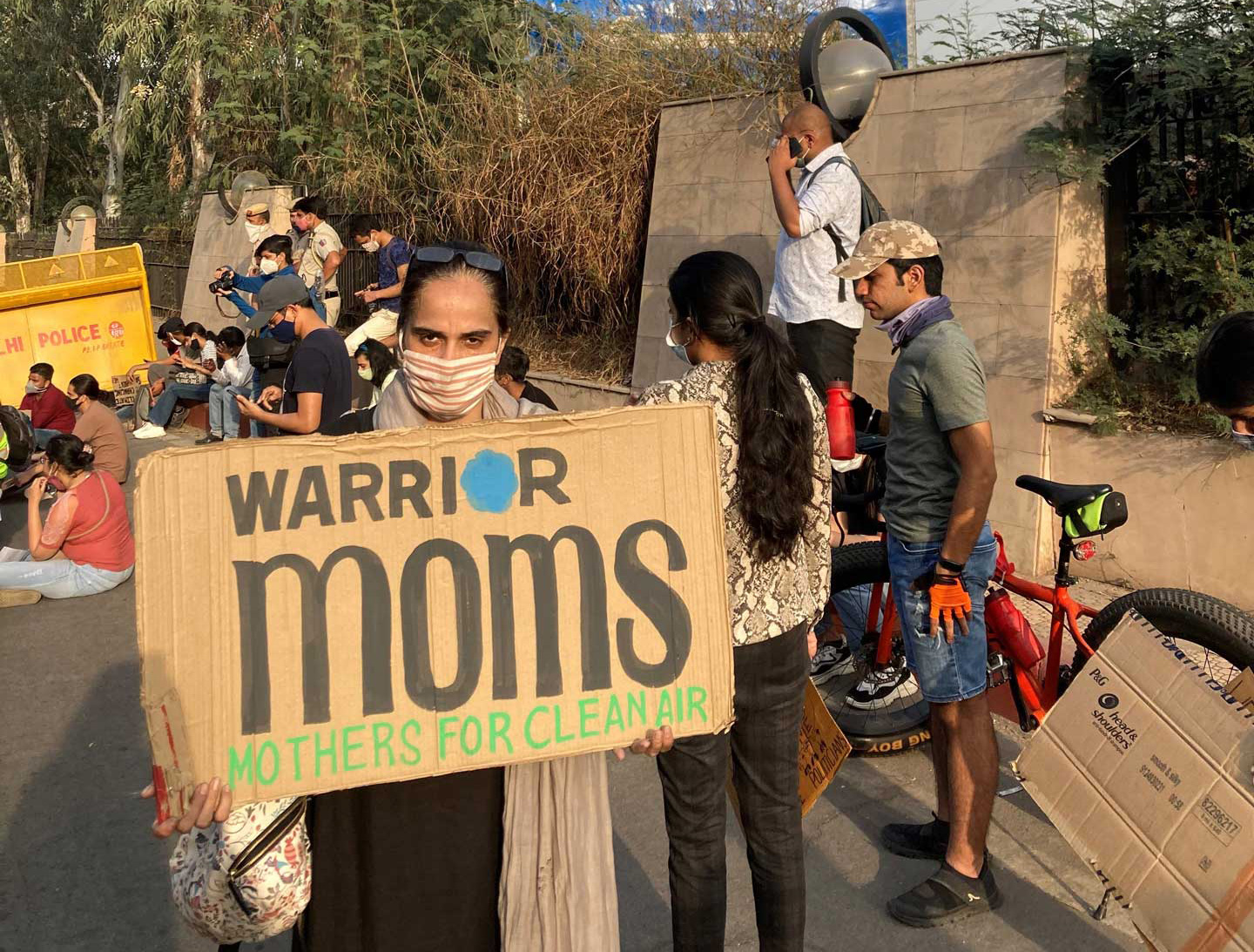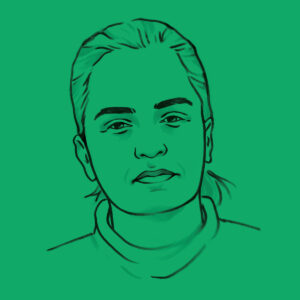“A newborn baby is effectively a smoker in Delhi”
Activist and mother Bhavreen Kandhari has been campaigning against air pollution since 2003
Activist and mother Bhavreen Kandhari has been campaigning against air pollution since 2003

Bhavreen Kandhari is an Indian activist who trained as a copywriter, and is the mother of 17-year-old twins. She helps to run campaigns including #DelhiTreesSOS, #ExtinctionRebellionIndia and #FridaysForFutureIndia. In 2020 she joined a pan- Indian movement called Warrior Moms, which now operates in 14 Indian states. She lives in New Delhi.
In conversation with journalist Pamela Druckerman

Bhavreen Kandhari
When did you start noticing New Delhi’s air pollution?
When I got married, my husband had to travel abroad for his work and I often joined him. In other countries, I seemed to breathe more easily and felt more active. In India I was more sluggish.
The big change happened after my twin daughters were born in 2003. I started to notice that, like most children in India, they constantly had runny noses or coughed continuously for months or even years. Yet when we left India for a holiday, it would magically vanish.
Surely others noticed this too?
In those days it seemed nobody would talk to me about it. The elders in our families would say it was probably an allergy, and they would play down colds or coughs that didn’t get better. No one knew about the AQI [Air Quality Index] or polluted air in India.
Schools didn’t understand or care either. When the AQI was 250, I would call to ask them to cancel sports matches. They would reply, “let them play, nothing happens”. Even our national cricketers and other professional athletes played matches on those days. Marathons happened at 300 AQI. I had to tell my daughters that they could not play basketball when the AQI was bad, and that would upset them.
What was the Indian government doing?
At that time there were not many studies. There was no National Clean Air Plan or monitoring, just the Central Pollution Board, which was a defunct body, and hasn’t changed much even now.
There was always denial. Those years, we were just trying to convince the government that air pollution existed. The authorities acknowledged that water was polluted, but not air. We weren’t even talking about the sources of the pollution.
What made people start to take notice?
One day in 2016 there was a crazy smog in Delhi. Everything was hazy and there was no sun and you were choking. That was the first time ever the schools were shut down in Delhi because of air pollution. Nowadays this is very common.
Parents were angry and about 300 came to protest – the first time I had seen such support. We were criticised by the media, who saw us as an elite movement arriving in SUVs. After that we had many more protests, but there was no way to convince the government because we were just ordinary citizens. We needed experts to explain that air pollution really existed, so we started connecting with doctors and scientists.
These experts have now produced many studies about how air pollution affects young children. What do we know?
Studies show that every single organ of the body is affected by air pollution, it’s not only the lungs. There’s asthma, other breathing disorders and damage to the nervous and reproductive systems. The damage begins when a women conceives; a newborn baby is effectively a smoker in Delhi. These studies come from valid sources. When we learned all this, the whole campaign got more aggressive. Doctors and scientists were speaking, and we were advocates, sharing their findings.
And poor children have it even worse?
Many rich schools have air purifiers, but the government schools obviously cannot afford that. There are also children whose families live on huge landfills. They’re breathing even worse toxic air, with carbon monoxide and methane.
What’s your strategy for combating this?
India has laws in place. Article 21 of the constitution guarantees the Right to Life and therefore the right to clean air and water. We are just asking the government to implement that. So we start with our own locality by questioning whether authorities are following the law.
We also make complaints using social media like Twitter. If we don’t complain and report violations, we cannot demand action. Therefore, Warrior Moms has launched a campaign called “KnowYourRights”, where details of violations are shared with mothers, who can then complain to authorities themselves with ease.
‘Our children’s lungs are being damaged and it is not reversible.’
For example, during the Diwali Festival, firecrackers cause air pollution. Warrior Moms, along with citizens, made over 5,000 complaints. This resulted in police action, but of course there were no arrests. Eventually the government will have to act. It’s costing our children their health, and otherwise why have laws?
Who are your fellow activists?
It is mostly young parents. We help each other, everybody using each other’s resources. They say, “my office will help you” or “my daughters will help you”. Some interns and lawyers are always there to give support for legal action.
How has Covid changed things?
When Covid hit, we saw blue skies! This proved that human activity causes air pollution, which is what we had been trying to tell the government for so many years. Everyone is talking about lungs now. We always wanted people to wear masks for air pollution when they were going out, but we could not convince them before. Now everybody is wearing masks, not realising that air pollution is a bigger killer than Covid.
The media were congratulating me after so many years of fighting back. I told them it wasn’t going to last, and that the moment we are back in aircraft and cars it will all come back, industrial pollution will return. We need to work on the sources of pollution, and not on post-pollution remedies that don’t help.
So the government is finally taking notice too?
We are talking more about it, but the action is still very limited. In Delhi, the most polluted capital in the world, we are prioritising cutting down trees and construction in the name of development. In the rest of the country, forests are being destroyed to make way for mining.
Every year there are the debates between central and state governments, but without solutions. We continue to breathe poison. Air pollution is a silent killer which nobody wants to believe in. It’s an even bigger threat than Covid. Our children’s lungs are being damaged and it is not reversible.
See how we use your personal data by reading our privacy statement.
This information is for research purposes and will not be added to our mailing list or used to send you unsolicited mail unless you opt-in.
See how we use your personal data by reading our privacy statement.